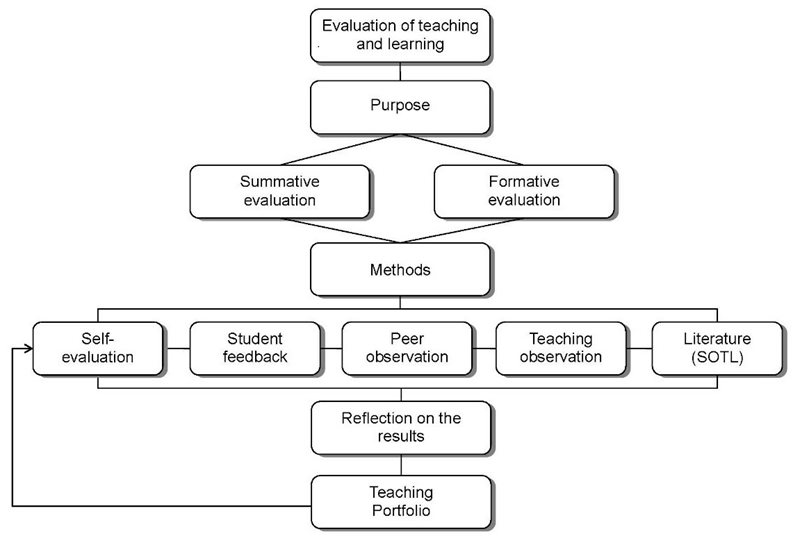The purpose of the Evaluation of teaching and course programme is to develop teaching and learning at the university though enabling academics to reflect on the learning and teaching within their disciplines. In particular, the programme aims to enable academics to use feedback from their students, peers and self-evaluation to develop their teaching practices and their modules.
The evaluation of learning and teaching is a continuous process, as depicted by the diagram below:

Why should we evaluate teaching and courses?
The Evaluation of Teaching and Courses Programme has been developed in response to the institutional Teaching and Learning Policy, which requires the university to assure the quality of the teaching and learning experiences offered to students. The process of evaluating our teaching speaks directly to the purpose of the Teaching and Learning Policy, which highlights the co-responsibility of academics and students for the quality of the learning experience provided.
As part of the practice of evaluation the teaching development team encourages academics to engages in a process which has become known as reflective practice, which entails using the classroom experience as an opportunity to consider the teaching philosophy and practice adopted in the classroom. Evaluation forms an integral part of teaching and professional development and should be treated as an on-going and comprehensive process, which is marked by careful planning and systematic implementation.
Where does one gather data for the evaluation of teaching and courses?
The most important consideration in teaching and courses evaluation is the purpose of the evaluation and which method of evaluation to adopt. The use of multiple methods of evaluation, involving multiple sources of data to enable triangulation is recommended. The data obtained from each evaluation strategy provides a balanced picture of our teaching, assessment, the course and the student experience. Through carefully considering the purposes of evaluation, and by crafting multiple methods of evaluation that suit those purposes, a reliable, valid, and fair evaluation approach can be developed and implemented.
Stephen Brookfield (1998) states that critically reflective practitioners constantly research their own assumption about their teaching practices by seeing practice through four complementary lenses: Firstly, the lens of their own reflective practice, secondly, the leans of learner’s eyes, thirdly, the lens of colleague perceptions, and finally, the lens of theoretical, philosophical and research literature. Viewing what one does through these difference lenses alerts one to distorted or incomplete aspects of our assumptions that need further investigation.
Purpose for course evaluations
-
To furnish information for the individual academic to use in assessing his/her course content and presentation.
-
To provide the individual student with an opportunity to offer constructive criticism to his/her teaching of the course.
-
To provide the student body with a voice in developing and maintaining an effective Faculty and curriculum.
How can the teaching development team assist?
-
Assisting with student feedback/evaluations
-
Conducting a teaching observation in your classroom
-
Finding literature on teaching and learning
-
Discussing the best way to feedback you have received
-
Building a portfolio
-
Offering departmental workshops on the evaluation of learning, teaching and courses
Reference
Brookfield, S. Critically reflective practice. In: The Journal of Continuing Education in the Health Professions. 178/4:197-205